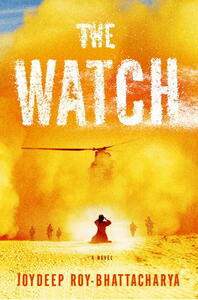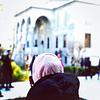You need to sign in or sign up before continuing.
Take a photo of a barcode or cover
I don't know what to think about this anti-war novel. All the cliche's and stereotypes are here and they are tiresome: tired careerist captain, indispensable but tired first sergeant, idealistic lieutenant, crude kids who only are somebody in the Army, the doc who reads the Koran and old British books on the Afghans, addiction to the God of War-adrenalin surge, Dear John letters, etc.. But it's a compelling tale and you wonder what's going to happen to them in this confrontation in the middle of nowhere. Is there going to be a mutiny? Are they going to be overrun? It's almost like a Spike Lee moral-do the right thing or follow orders? They certainly could have used a cultural advisor. The author assigns major characters a chapter to relate the unfolding events from their perspective. We only hear from those in authority for the military. But we also hear from the Afghan girl holding the vigil outside the base as well as the Afghan interpreter. I think it would have been interesting to hear the story told by the dead Afghan, the Prince of the Mountains, whose body is the subject of his sister's quest. The best chapter was the journal of the lieutenant who was beloved by his troops. The ending was a real disappointment. I don't want to spoil it but maybe that was the whole point of the book-war is meant to disappoint, if you are lucky. If you aren't lucky, you're either dead or devastated by its aftermath. The one big takeaway for me was that there are hyenas in Afghanistan. Who knew?
An intriguing though not entirely successful novel. A compelling incident seen from multiple points of view.
A very interesting interpretation and reinvention of Sophocles masterpiece. I’m teaching the original to my students now, and it’s interesting to get a different take on it.
dark
emotional
medium-paced
Plot or Character Driven:
Plot
Strong character development:
Complicated
Loveable characters:
No
Diverse cast of characters:
Yes
Flaws of characters a main focus:
Yes
This was a difficult book to read. So much heartache and misunderstanding.
Reading the different view points in first person made the difficulties more immediate and real.
Reading the different view points in first person made the difficulties more immediate and real.
Probably a two but there were some good chapters. I do not like retellings of old tales - and I wish the Pashtun woman would have been focused on more. I think Redeployment is a better novel focusing on the Iraq and Afghanistan wars.
A confrontation in front of an army base in Afghanistan told from a multitude of perspectives; a bracingly blunt look at the tragedy of people stopped by circumstances out of their control from being able to treat each other with humanity, even when they desperately want to.
'When you kill people and wipe out their families, strafe their homes and burn down their villages, litter their fields with fragmentation bombs and gun down their livestock, you've lost the whole battle for hearts and minds.'
This book was randomly selected out of many others during my visit to the BBW book sale around 2 years ago. Having watched my fair share of war films, especially those that sets around Afghanistan, the synopsis on the back cover was intriguing. And it proves to be an interesting read after all.
The Watch is a story of the war in Afghanistan, specifically sets around a combat outpost in Tarsandar, Kandahar Province. A crippled yet strong-willed Pashtun girl, Nizam, crawled all her way from her home in the mountains to claim her brother's corpse - who was killed in a firefight with the US army - for a proper burial. The US army - bewildered from losing their own men at war - was torn between revenge, humanity, morale and duty which further explicates the futility of war towards those who fights it and their families.
The whole story was engrossingly told from the narratives of those involved; Nizam the grieving sister, Masood the interpreter, the Lieutenant, the Medic, the Second Lieutenant, the First Sergeant and finally, the Captain. From each narrative, readers will be enthralled by their respective point of view regarding their given situation and how they choose to act upon it. Each of their psychological and emotional setbacks were exposed, which further explains their clouded judgements and arduous decision-making process.
The Watch offers a deeper and diverse view of heartbreak, grief and mental breakdowns of both the killers and killed. One would have thought that those who wield guns and shoot on sight upon orders are emotionless killers. But army personnel are not mere killing machines without feelings. The guilt, psychological and emotional setbacks of army veterans who've killed or witness countless deaths in the warzone are beyond the imagination of normal civilians.
This book was randomly selected out of many others during my visit to the BBW book sale around 2 years ago. Having watched my fair share of war films, especially those that sets around Afghanistan, the synopsis on the back cover was intriguing. And it proves to be an interesting read after all.
The Watch is a story of the war in Afghanistan, specifically sets around a combat outpost in Tarsandar, Kandahar Province. A crippled yet strong-willed Pashtun girl, Nizam, crawled all her way from her home in the mountains to claim her brother's corpse - who was killed in a firefight with the US army - for a proper burial. The US army - bewildered from losing their own men at war - was torn between revenge, humanity, morale and duty which further explicates the futility of war towards those who fights it and their families.
The whole story was engrossingly told from the narratives of those involved; Nizam the grieving sister, Masood the interpreter, the Lieutenant, the Medic, the Second Lieutenant, the First Sergeant and finally, the Captain. From each narrative, readers will be enthralled by their respective point of view regarding their given situation and how they choose to act upon it. Each of their psychological and emotional setbacks were exposed, which further explains their clouded judgements and arduous decision-making process.
The Watch offers a deeper and diverse view of heartbreak, grief and mental breakdowns of both the killers and killed. One would have thought that those who wield guns and shoot on sight upon orders are emotionless killers. But army personnel are not mere killing machines without feelings. The guilt, psychological and emotional setbacks of army veterans who've killed or witness countless deaths in the warzone are beyond the imagination of normal civilians.
A very good book. Love the changes in perspectives with each chapter.





